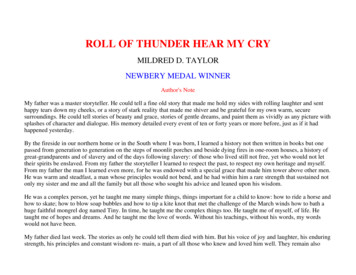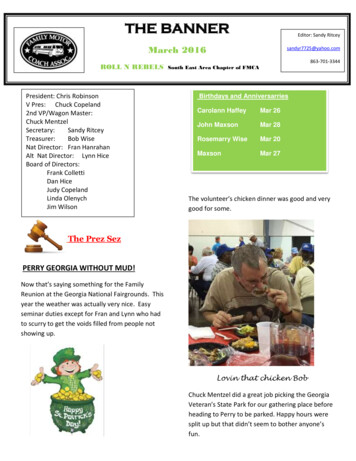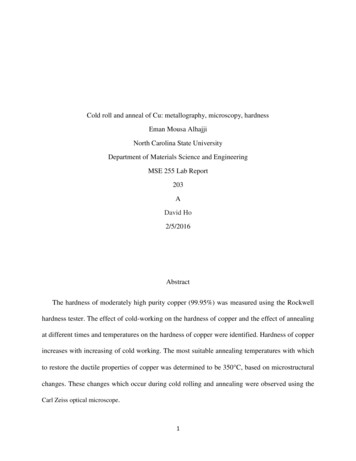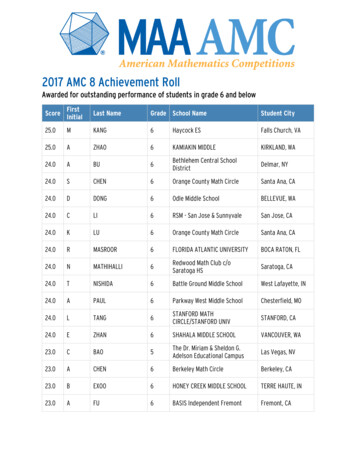
Transcription
ROLL OF THUNDER HEAR MY CRYMILDRED D. TAYLORNEWBERY MEDAL WINNERAuthor's NoteMy father was a master storyteller. He could tell a fine old story that made me hold my sides with rolling laughter and senthappy tears down my cheeks, or a story of stark reality that made me shiver and be grateful for my own warm, securesurroundings. He could tell stories of beauty and grace, stories of gentle dreams, and paint them as vividly as any picture withsplashes of character and dialogue. His memory detailed every event of ten or forty years or more before, just as if it hadhappened yesterday.By the fireside in our northern home or in the South where I was born, I learned a history not then written in books but onepassed from generation to generation on the steps of moonlit porches and beside dying fires in one-room houses, a history ofgreat-grandparents and of slavery and of the days following slavery: of those who lived still not free, yet who would not lettheir spirits be enslaved. From my father the storyteller I learned to respect the past, to respect my own heritage and myself.From my father the man I learned even more, for he was endowed with a special grace that made him tower above other men.He was warm and steadfast, a man whose principles would not bend, and he had within him a rare strength that sustained notonly my sister and me and all the family but all those who sought his advice and leaned upon his wisdom.He was a complex person, yet he taught me many simple things, things important for a child to know: how to ride a horse andhow to skate; how to blow soap bubbles and how to tip a kite knot that met the challenge of the March winds how to bath ahuge faithful mongrel dog named Tiny. In time, he taught me the complex things too. He taught me of myself, of life. Hetaught me of hopes and dreams. And he taught me the love of words. Without his teachings, without his words, my wordswould not have been.My father died last week. The stories as only he could tell them died with him. But his voice of joy and laughter, his enduringstrength, his principles and constant wisdom re- main, a part of all those who knew and loved him well. They remain also
within the pages of this book, its guiding spirit and total power.MILDRED D. TAYLORApril 1976One'Little Man, would you come on! You keep it up and you're gonna make us late.'My youngest brother paid no attention to me. Grasping more firmly his newspaper-wrapped notebook and his tin can lunch ofcornbread and oil sausages, he continued to concentrate on the dusty road. He lagged several feet behind my other brothers,Stacey and Christopher-John, and me, attempting to keep the rusty Mississippi dust from swelling with each step and driftingback upon his shiny black shoes and the cuffs of his corduroy pants by lifting each foot high before setting it gently downagain. Always meticulously neat, six-year old Little Man never allowed dirt or tears or stains to mar anything he owned.Today was no exception.'You keep it up and make us late for school, Mama's gonna wear you out.' I threatened, pulling with exasperation at the highcollar of the Sunday dress Mama had made me wear for the first day of school - as if that event were something special. itseemed to me that showing up at school at all on a bright August-like October morning made for running the cool forest trailsand wading barefoot in the forest pond was concession enough; Sunday clothing was asking too much. Christopher-John andStacey were not too pleased about the clothing or school either. Only Little Man, just beginning his school career, found theprospects of both intriguing.'Y'all go ahead and get dirty if y'all wanna,' he replied without even looking up from his studied steps, 'Me, I'm gonna stayclean.'‘I betcha Mama's gonna "clean" you, you keep it up.' I grumbled.‘Ah, Cassie, leave him be,' Stacey admonished, frowning and kicking testily at the road.
‘I ain't said nothing but.’Stacey cut me a wicked look and I grew silent. His disposition had been irritatingly sour lately. If I hadn't known the cause ofit. I could have forgotten very easily that he was at twelve, bigger than I, and that I had promised Mama to arrive at schoollooking clean and ladylike. 'Shoot,' I mumbled finally, unable to restrain myself from further comment, 'it ain't my fault yougotta be in Mama's class this year.'Stacey's frown deepened and he jammed his fists into his pockets, but said nothing.Christopher-John, walking between Stacey and me, glanced uneasily at both of us but did not interfere. A short, round boy ofseven, he took little interest in troublesome things, preferring to remain on good terms with everyone, Yet he was alwayssensitive to others and now, shifting the handle of his lunch can from his right hand to his right wrist and his smudgednotebook from his left hand to his left armpit. he stuffed his free hands into his pockets and attempted to make his face asmoody as Stacey's and as cranky as mine. But after a few moments he seemed to forget that he was supposed to be grouchyand began whistling cheerfully. There was little that could make Christopher-John unhappy for very long, not even thethought of school.I tugged again at my collar and dragged my feet in the dust, allowing it to sift back onto my socks and shoes like gritty redsnow. I hated the dress. And the shoes. There was little I could do in a dress, and as for shoes, they imprisoned freedomloving feet accustomed to the feel of the warm earth,‘Cassie, stop that,' Stacey snapped as the dust billowed in swirling clouds around my feet. I looked up sharply, ready toprotest. Christopher-John's whistling increased to a raucous, nervous shrill. and grudgingly T let the matter drop and trudgedalong in moody silence, my brothers growing as pensively quiet as I.Before us the narrow, sun-splotched road wound like a lazy red serpent dividing the high forest bank of quiet, old trees on theleft from the cotton field, forested by giant green-and-purple stalks. on the right. A barbed-wire fence ran the length of thedeep field, stretching eastward for over a quarter of a mile until it met the sloping green pasture that signaled the end of ourfamily's four hundred acres, An ancient oak tree on the slope, visible even now, was the official dividing mark betweenLogan land and the beginning of a dense forest. Beyond the protective fencing of the forest, vast farming fields, worked by amultitude of share- cropping families, covered two-thirds of a ten-square-mile plantation. That was Harlan Granger land.Once our land had been Granger land too, but the Grangers had sold it during Reconstruction to a Yankee for tax money. In
1887, when the land was up for sell again, Grandpa had bought two hundred acres of it, and in 19I8, after the first twohundred acres had been paid off, he had bought another two hundred, It was good rich land, much of it still virgin forest, andthere was no debt on half of it. But there was a mortgage on the two hundred acres bought in 1918 and there were taxes on thefull four hundred, and for the past three years there had not been enough money from the cotton to pay both and live on too.That was why Papa had gone to work on the railroad.In 1930 the price of cotton dropped, And so, in the spring of 1931, Papa set out looking for work, going as far north asMemphis and as far south as the Delta country, He had gone west too, into Louisiana. It was there he found work laying trackfor the railroad. He worked the remainder of the year away from us, not returning until the deep winter when the ground wascold and barren. The following spring after the planting was finished. he did the same. Now it was 1933 and Papa was againin Louisiana laying track,I asked him once why he had to go away, why the land was so important. He took my hand and said in his quiet way: 'Lookout there, Cassie girl. All that belongs to you. You ain't never had to live on nobody's place but your own and long as I liveand the family survives, you'll never have to. That's important. You may not understand that now, but one day you will. Thenyou'll see.I looked at Papa strangely when he said that, for I knew that all the land did not belong to me. Some of it belonged to Stacey,Christopher-John, and Little Man, not to mention the part that belonged to Big Ma. Mama, and Uncle Hammer, Papa's olderbrother who lived in Chicago. But Papa never divided the land in his mind: it was simply Logan land. For it he would workthe long, hot summer pounding steel: Mama would teach and run the farm; Big Ma, in her sixties, would work like a womanof twenty in the fields and keep the house; and the boys and I would wear threadbare clothing washed to dishwater color: butalways, the taxes and the mortgage would be paid. Papa said that one day I would understand.I wondered.When the fields ended and the Granger forest fanned both sides of the road with long overhanging branches, a tall,emaciated-looking boy popped suddenly from a forest trail and swung a thin arm around Stacey. It was T. J. Avery. Hisyounger brother Claude emerged a moment later, smiling weakly as if it pained him to do so. Neither boy had on shoes, andtheir Sunday clothing, patched and worn, hung loosely upon their frail frames. The Avery family share- cropped on Grangerland.
'Well.' said T.J. jauntily swinging into step with Stacey, there we go again startin' another school year.'Yeah,' sighed Stacey,'Ah, man, don't look so down,' T.J. said cheerfully. 'Your mama's really one great teacher. I should know.' He certainlyshould. He had failed Mama's class last year and was now returning for a second try,'Shoot! You can say that,' exclaimed Stacey. 'You don't have to spend all day in a classroom with your mama.''Look on the bright side,' said T.J. 'Jus' think of the advantage you've got. You'll be learnin' all sorts of stuff 'fore the rest ofus.' He smiled slyly. 'like what's on all them tests.Stacey thrust T.J.'s arm from his shoulders. 'If that's what you think, you don't know Mama.''Ain't no need gettin' mad,' T.J. replied undaunted. 'Jus' an idea.' He was quiet for a moment, then announced,'I betcha I could give y'all an earful 'bout that burnin' last night.''Burning I What burning?' asked Stacey.'Man, don't y'all know nothin'! The Berrys' burnin'. I thought y'all's grandmother went over there last night to see 'bout 'em.'Of course we knew that Big Ma had gone to a sick house last night. She was good at medicines and people often called herinstead of a doctor when they were sick. But we didn't know anything about any burnings, and I certainly didn't knowanything about any Berrys either.'What Berrys he talking 'bout, Stacey!' I asked. 'I don't know no Berrys.'They live way over on the other side of Smellings Creek. They come up to church sometimes,' said Stacey absently. Then heturned back to T.J. 'Mr. Lanier come by real late and got Big Ma. Said Mr. Berry was low sick and needed her to help nursehim, but he ain't said nothing 'bout no burning.''He's low sick all right 'cause he got burnt near to death. Him and his two nephews, And you know who done
'Who!' Stacey and I asked together.'Well, since y'all don't seem to know nothin',' said T.J., in his usual sickening way of nursing a tidbit of information to death,'maybe I ought not tell y'all, It might hurt y'all's little ears.''Ah, boy,' I said, 'don't start that mess again.' I didn't like T.J. very much and his stalling around didn't help.'Come on, T.J.,' said Stacey, 'out with it.''Well .' T.J. murmured, then grew silent as if considering whether or not he should talk,We reached the first of two crossroads and turned north; another mile and we would approach the second crossroads and turneast again.Finally T.J. said, 'Okay. See, them Berrys' burnin' wasn't no accident. Some white men took a match to 'em,''Y-you mean just lit 'em up like a piece of wood!' stammered Christopher-John, his eyes growing big with disbelief. 'Butwhy!' asked Stacey,T.J. shrugged. 'Don't know why. Jus' know they done it, that's all.''How you know !' I questioned suspiciously.He smiled smugly. ''Cause your mama come down on her way to school and talked to my mama 'bout it.''She did !''Yeah, and you should've seen the way she look when she come outa that house.''How'd she look!' inquired Little Man, interested enough to glance up from the road for the first time.T.J. looked around grimly and whispered. 'like. death.' He waited a moment for his words to be appropriately shocking, butthe effect was spoiled by Little Man, who asked lightly, 'What does death look like !'
T.J. turned in annoyance. 'Don't he know nothin'!''Well, what does it look like?' Little Man demanded to know. He didn't like T.J. either, 'Like my grandfather looked jus' 'forethey buried him, T.J. described all-knowingly.'Oh.' replied Little Man, losing interest and concentrating on the road again.'I tell ya. Stacey, man,' said T.J. morosely, shaking his head. 'sometimes I jus' don't know 'bout that family of yours.Stacey pulled back, considering whether or not T.J.'s words were offensive. but T.]. immediately erased the question bycontinuing amiably. 'Don't get me wrong, Stacey. They some real swell kids, but that Cassie 'bout got me whipped thismornin'.'Good !' I said.'Now how'd she do that !' Stacey laughed.'You wouldn't be laughin' if it'd've happened to you. She up and told your mama 'bout me goin' up to that Wallace storedancin' room and Miz Logan told Mama.' He eyed me disdainfully then went on. 'But don't worry, I got out of it though.When Mama asked me 'bout it, I jus' said ole Claude was always sneakin' up there to get some of that free candy Mr. Kalebgive out sometimes and I had to go and get him 'cause I knowed good and well she didn't want us up there. Boy, did he getit?' T.J. laughed. 'Mama 'bout wore him out.I stared at quiet Claude. 'You let him do that!' I exclaimed. But Claude only smiled in that sickly way of his and I knew thathe had. He was more afraid of T.J. than of his mother.Again Little Man glanced up and I could see his dislike for T.J. growing. Friendly Christopher-John glared at T.J., andputting his short arm around Claude's shoulder said. 'Come on, Claude. let's go on ahead.' Then he and Claude hurried up theroad, away from T.J.Stacey, who generally overlooked T.J.'s underhanded stunts, shook his head. 'That was dirty. 'Well, what'd ya expect me todo! I couldn't let her think I was g-oin' up there 'cause I like to, could I! She' d've killed me!''And good riddance.' I thought, promising myself that if he ever pulled anything like that on me, I'd knock his block off.
We were nearing the second crossroads, where deep gullies lined both sides of the road and the dense forest crept to the veryedges of high. jagged, clay-walled banks. Suddenly, Stacey turned, 'Quick!' he cried. 'Off the road!' Without another word, allof us but Little Man scrambled up the steep right bank into the forest.'Get up here, Man.' Stacey ordered, but Little Man only gazed at the ragged red bank sparsely covered with scraggly brownbriars and kept on walking .'Come on, do like I say.'But I'll get my clothes dirty i' protested Little Man. 'You're gonna get them a whole lot dirtier you stay down there. Look!'Little Man turned around and watched saucer-eyed as a bus bore down on him spewing clouds of red dust like a huge yellowdragon breathing fire. Little Man headed toward the bank, but it was too steep. He ran frantically along the road looking for afoothold and, finding one, hopped onto the bank, but not before the bus had sped past enveloping him in a scarlet haze whilelaughing white faces pressed against the bus windows.Little Man shook a threatening fist into the thick air, then looked dismally down at himself.'Well, ole Little Man done got his Sunday clothes dirty, T.J. laughed as we jumped down from the bank. Angry tears welledin Little Man's eyes but he quickly brushed them away before T.J. could see them.'Ah, shut up, T.J.,' Stacey snapped,'Yeah, shut up. T.J.,' I echoed.'Come on, Man,' Stacey said,' and next time do like I tell ya.'Little Man hopped down from the bank. 'How's come they did that. Stacey, huh!' he asked. dusting himself off. 'How's comethey didn't even stop for us !'''Cause they like to see us run and it ain't our bus.' Stacey said, balling his fists and jamming them tightly into his pockets.'Well, where's our bus !' demanded Little Man.'We ain't got one.'
'Well, why not!''Ask Mama,' Stacey replied as a towheaded boy, bare- footed and pale. came running down a forest path toward us. The boyquickly caught up and fell in stride with Stacey and T.J.'Hey, Stacey,' he said shyly. 'Hey, Jeremy,' Stacey said.There was an awkward silence.'Y'all jus' startin' school today !''Yeah.' replied Stacey,'I wishin' ours was jus' startin',' sighed Jeremy. 'Ours been goin' since the end of August.' Jeremy's eyes were a whitewashedblue and they seemed to weep when he spoke.'Yeah,' said Stacey again.Jeremy kicked the dust briskly and looked toward the north. He was a strange boy. Ever since I had begun school, he hadwalked with us as far as the crossroads in the morning. and met us there in the afternoon. He was often ridiculed by the otherchildren at his school and had shown up more than once with wide red welts on his arms which Lillian Jean, his older sister,had revealed with satisfaction were the result of his associating with us. Still, Jeremy continued to meet us.When we reached the crossroads, three more children, a girl of twelve or thirteen and two boys, all looking very much likeJeremy, rushed past, The girl was Lillian Jean, 'Jeremy, come on.' she said without a backward glance, and Jeremy, smilingsheepishly, waved a timid good-bye and slowly followed her.We stood in the crossing gazing after them. Jeremy looked back once but then Lillian Jean yelled shrilly at him and he did notlook back again. They were headed for the Jefferson Davis County School. a long white wooden building looming in thedistance. Behind the building was a wide sports field around which were scattered rows of tiered gray-looking benches. Infront of it were two yellow buses, our own tormentor and one that brought students from the other direction, and loiteringstudents awaiting the knell of the morning bell. In the very center of the expansive front lawn, waving red, white and bluewith the emblem of the Confederacy emblazoned in its upper left-hand corner. was the Mississippi nag. Directly below it wasthe American flag. As Jeremy and his sister and brothers hurried reward those transposed flags, we turned eastward toward
our own school.The Great Faith Elementary and Secondary School, one of the largest black schools in the county, was a dismal end to anhour's journey. Consisting of four weather-beaten wooden houses on stilts of brick. 320 students, seven teachers. a principal.a caretaker, and the caretaker's cow, which kept the wide crabgrass lawn sufficiently clipped in spring and summer, theschool was located near three plantations, the largest and closest by far being the Granger plantation. Most of the studentswere from families that sharecropped on Granger land, and the others mainly from Montier and Harrison plantation families.Because the students were needed in the fields from early spring when the cotton was planted until after most of the cottonhad been picked in the fall, the school adjusted its terms accordingly, beginning in October and dismissing in March. Buteven so, after today a number of the older students would not be seen again for a month or two, not until the last puff ofcotton had been gleaned from the fields, and eventually most would drop out of school altogether. Because of this the classesin the higher grades grew Smaller with each passing year.The class buildings, with their backs practically against the forest wall, formed a semicircle facing a small one-room churchat the opposite edge of the compound. It was to this church that many of the school's students and their parents belonged. Aswe arrived, the enormous iron bell in the church belfry was ringing vigorously, warning the milling students that only fiveminutes of freedom remained.Little Man immediately pushed his way across the lawn to the well. Stacey and T.J., ignoring the rest of us now that theywere on the school grounds, wandered off to be with the other seventh-grade boys, and Christopher-John and Claude rushedto reunite with their classmates of last year. Left alone, I dragged slowly to the building that held the first four grades and saton the bottom step. Plopping my pencils and notebook into the dirt, I propped my elbows on my knees and rested my chin inthe palms of my hands.'Hey, Cassie,' said Mary Lou Wellever, the principal's daughter, as she flounced by in a new yellow dress.'Hey, yourself,' I said, scowling so ferociously that she kept on walking. I stared after her a moment noting that she wouldhave on a new dress. Certainly no one else did. Patches on faded pants and dresses abounded on boys and girls come sorecently from the heat of the cotton fields. Girls stood awkwardly, afraid to sit, and boys pulled restlessly at starched, highbuttoned collars. Those students fortunate enough to have shoes hopped from one pinched foot to the other. Tonight theSunday clothes would be wrapped in newspaper and hung for Sunday and the shoes would be packed away to be brought outagain only when the weather turned so cold that bare feet could no longer traverse the frozen roads: but for today we allsuffered.
On the far side of the lawn I spied Moe Turner speeding toward the seventh-grade-class building, and wondered at his energy.Moe was one of Stacey's friends. He lived on the Montier plantation, a three-and-a-half-hour walk from the school. Becauseof the distance. many children from the Montier plantation did not come to Great Faith after they had finished the four-yearschool near Smellings Creek. But there were some girls and boys like Moe who made the trek daily, leaving their homeswhile the sky was black and not returning until all was blackness again. I for one was certainly glad that I didn't live that faraway. I don't think my feet would have wanted that badly for me to be educated.The chiming of the second bell began. I stood up dusting my bottom as the first, second, third, and fourth graders crowded upthe stairs into the hallway. Little Man flashed proudly past, his face and hands clean and his black shoes shining again. Iglanced down at my own shoes powdered red and, raising my right foot, rubbed it against the back of my left leg, thenreversed the procedure. As the last gong of the bell reverberated across the compound, I swooped up my pencils andnotebook and ran inside.A hallway extended from the front to the back door of the building. On either side of the hallway were two door- ways. bothleading into the same large room which was divided into two classrooms by a heavy canvas curtain. The second and thirdgrades were on the left, the first and fourth grades on the right. I hurried to the rear of the building, turned to the right, andslid into a third-row bench occupied by Gracey Pearson and Alma Scott.'You can't sit here.' objected Gracey. 'I'm saving it for Mary Lou.I glanced back at Mary Lou Wellever, depositing her lunch pail on a shelf in the back of the room and said, 'Not any moreyou ain't,'Miss Daisy Crocker, yellow and buckeyed, glared down at me from the middle of the room with a look that said, 'Soooooooo,it's you, Cassie Logan.' Then she pursed her lips and drew the curtain along the rusted iron rod and tucked it into a wide loopin the back wall. With the curtain drawn back, the first graders gazed quizzically at us. Little Man sat by a window, his handsfolded, patiently waiting for Miss Crocker to speak.Mary Lou nudged me. 'That's my seat, Cassie Logan.'Mary Lou Wellever,' Miss Crocker called primly, 'have a seat.''Yes, ma'am,' said Mary Lou, eyeing me with a look of pure hate before turning away.
Miss Crocker walked stiffly to her desk, which was set on a tiny platform and piled high with bulky objects covered by atarpaulin, She rapped the desk with a ruler, although the room was perfectly still, and said, 'Welcome, children, to Great FaithElementary School.' Turning slightly so that she stared squarely at the left side of the room, she continued, 'To all of youfourth graders, it's good to have you in my class. I'll be expecting many good and wonderful things from you.' Thenaddressing the right side of the room, she said, ‘And to all our little first grade friends only today starting on the road toknowledge and education, may your tiny feet find the pathways of learning steady and forever before you.'Already bored, I stretched my right arm on the desk and rested my head in my upraised hand.Miss Crocker smiled mechanically, then rapped on her desk again. 'Now, little ones,' she said, still talking to the first grade,'your teacher, Miss Davis, has been held up in Jackson for a few days so I'll have the pleasure of sprinkling your little mindswith the first rays of knowledge.' She beamed down upon them as if she expected to be applauded for this bit of news, thenwith a swoop of her large eyes to include the fourth graders, she went on.'Now since there's only one of me, we shall have to sacrifice for the next few days. We shall work, work, work. but we shallhave to work like little Christian boys and girls and share, share, share. Now are we willing to do that!''YES'M. MIZ CROCKER,' the children chorused.But I remained silent. I never did approve of group responses. Adjusting my head in my hand, I sighed heavily, my mind onthe burning of the Berrys.'Cassie Logan!'I looked up, startled.'Cassie Logan!''Yes, ma'am!' I jumped up quickly to face Miss Crocker.'Aren't you willing to work and share !''Yes'm.’
‘Then say so!''Yes'm,' I murmured, sliding back into my seat as Mary Lou. Gracey, and Alma giggled. Here it was only five minutes intothe new school year and already I was in trouble.By ten o'clock, Miss Crocker had rearranged our seating and written our names on her seating chart. I was still sitting besideGracey and Alma but we had been moved from the third to the first row in front of a small potbellied stove. Although beingeyeball to eyeball with Miss Crocker was nothing to look forward to, the prospect of being warm once the cold weather set inwas nothing to be sneezed at either, so I resolved to make the best of my rather dubious position.Now Miss Crocker made a startling announcement: 'This year we would all have books.Everyone gasped, for most of the students had never handled a book at all besides the family Bible. I admit that even I wassomewhat excited. Although Mama had several books. I had never had one of my very own.'Now we're very fortunate to get these readers,' Miss Crocker explained while we eagerly awaited the unveiling. The countysuperintendent of schools himself brought these books down here for our use and we must take extra-good care of them.' Shemoved toward her desk. 'So let's all promise that we'll take the best care possible of these new books.' She stared down,expecting our response. 'All right, all together, let's repeat, "We promise to take good care of our new books."' She lookedsharply at me as she spoke.'WE PROMISE TO TAKE GOOD CARE OF OUR NEW BOOKS!''Fine,' Miss Crocker beamed, then proudly threw back the tarpaulin.Sitting so close to the desk, I could see that the covers of the books, a motley red, were badly worn and that the gray edges ofthe pages had been marred by pencils, crayons, and ink. My anticipation at having my own book ebbed to a sinkingdisappointment. But Miss Crocker continued to beam as she called each fourth grader to her desk and, recording a number inher roll book, handed him or her a book.As I returned from my trip to her desk, I noticed the first graders anxiously watching the disappearing pile. Miss Crockermust have noticed them too, for as I sat down she said, 'Don't worry, little ones, there are plenty of readers for you too. Seethere on Miss Davis's desk.' Wide eyes turned to the covered teacher's platform directly in front of them and an audible sighof relief swelled in the room.
I glanced across at Little Man, his face lit in eager excitement. I knew that he could not see the soiled covers or the marredpages from where he sat, and even though his penchant for cleanliness was often annoying, I did not like to think of hisdisappointment when he saw the books as they really were. But there was nothing that I could do about it, so I opened mybook to its center and began browsing through the spotted pages. Girls with blond braids and boys with blue eyes stared up atme. I found a story about a boy and his dog lost in a cave and began reading while Miss Crocker's voice droned onmonotonously.Suddenly I grew conscious of a break in that monotonous tone and I looked up. Miss Crocker was sitting at Miss Davis's deskwith the first-grade books stacked before her, staring fiercely down at Little Man, who was pushing a book back upon thedesk.'What's that you said, Clayton Chester Logan !' she asked. The room became gravely silent. Everyone knew that Little Manwas in big trouble for no one, but no one, ever called Little Man 'Clayton Chester' unless she or he meant serious business.Little Man knew this too. His lips parted slightly as he took his hands from the book. He quivered, but he did not take hiseyes from Miss Crocker.'I –I said may I have another book please, ma'am,' he squeaked. 'That one's dirty.''Dirty !' Miss Crocker echoed, appalled by such temerity. She stood up, gazing down upon Little Man like a bony giant, butLittle Man raised his head and continued to look into her eyes. 'Dirty! And just who do you think you are, Clayton Chester!Here the county is giving us these wonderful books during these hard times and you're going to stand there and tell me thatthe book's
Now it was 1933 and Papa was again in Louisiana laying track, I asked him once why he had to go away, why the land was so important. He took my hand and said in his quiet way: 'Look out there, Cassie girl. All that belongs to you. You ain't never had to live on nobody











